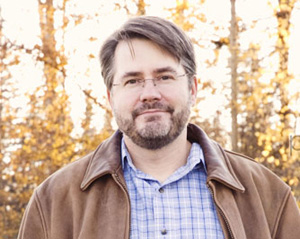Tracing the Handprint of Og:
Katie Weaver in Conversation
with Michael Carson

Malahat volunteer Katie Weaver talks with 2015 Open Season Nonfiction Award winner Michael Carson about his prize-winning memoir, "The Neanderthal and the Cave." The memoir will appear in Issue 190, Spring 2015 of the Malahat.
Click here for the original announcement page on Mike Carson's Open Season Award win.
Your winning memoir feels like something that came from a deep place. Is this a topic you've tried more than once to write about, or did the idea spark once you came across Robert McCrum's claim?
If by “the idea” you mean the notion that life is fleeting and uncertain and that artistic expression is an innate (and likely futile) grasping for immortality and meaning, I can’t take any credit for it. That idea is an old and universal one. We find it in Shakespeare’s sonnets and on Keats’s grave; it’s stamped on the face of Shelley’s Ozymandias and emblazoned across van Gogh’s strange but oddly comforting stars. What I tried to do was to strip away all of the extraneous trappings of the modern world and explore, in a rather absurd way, how that basic human desire might have looked in our earliest ancestors.
As for the McCrum article, it did upset me, but I wanted to express the importance of keeping things in perspective: commercial success (McCrum’s idea of a literary career) is not, ultimately, the reason we are driven to create. I would love to write a best-selling novel, but failing to do that does not mean, at least to me, that the act of creation was meaningless. I will be more than content to think that someone, somewhere, finds comfort and beauty in something I have written. I also like to think that my own children will be able to understand something about me by reading my words.
I have to ask: “Bitch-Goddess”—how did you come up with it? And why is she a woman?
I was expecting this question (although the subtitle, “Why I Continue to Write in Defiance of the Hideous Bitch-Goddess, Probability” has been dropped from the text that will appear in The Malahat Review). I meant no offense; I just had this image of the Anti-Muse (I believe the Muses were all female) who, instead of dropping by with a little much-needed inspiration, brings only self-doubt. I believe that any creative person (or any procrastinator) can relate: I think writing is really hard, and it’s easy to become frustrated and distracted. The ‘Bitch-Goddess’ is the Death Crone that whispers in your ear, “Hey, you know what’s more fun than writing the same sentence over and over again? Everything. How about we play Candy Crush? Won’t that be nice?” For me, I imagined this voice as seductive and female, but every person will hear it differently, I expect.
I found it interesting how you confront the idea that people over 40 cannot have a writing career, and yet at times I read your tone to be youthful. Do you have anything to say to this? Was it on purpose?
Thank you. I took one of those Internet quizzes the other day called “What is Your Real Age?” Apparently, mentally I am only 28, which seems about right, although I suspect I only achieved this result because I listed my preferences as “beer and pizza” instead of “prune juice and creamed corn.” Actually, I think that teaching young people gives me a different perspective on things. I certainly feel the generation gap growing year by year, but I still feel like I can relate to them. Sometimes, though, when I look in the mirror I am really surprised: I just don’t feel as old as I look. As for the tone of the story, I really do tell my students the story of Og, so I suppose I was thinking of that audience when I wrote it down.
It is astounding how connected I was to Og by the end of the piece, especially being a writer. Take me through the process of how and where Og was created in your mind. What was the moment when you understood why you write? What came first—Og, or that revelation?
I’m glad that you could relate to Og. I tried to make him a character that was universally identifiable—I know most days I feel like a Neanderthal struggling to make sense of an increasingly complex world. Og has been with me for a long time. Right after my sons were born, I felt this incredible sense of responsibility, and, quite frankly, terror about the uncertainty of the future. I tried to imagine what it must have been like for early people, like Og, who had to face the same uncertainties without benefit of any modern conveniences. I jotted down a few descriptive paragraphs about how a cave-family like Og’s might respond to the birth of a child by placing hand prints on a cave wall, paralleling my own response: writing about the experience. I wanted to emphasize the idea that what makes us ‘human’ (even for a Cro-Magnon or Neanderthal) has not changed that much over time.
I made Og a Neanderthal because of some recent research suggesting that the earliest cave paintings may have been done by Neanderthals rather than Cro-Magnon (and, more importantly, because this is creative nonfiction not anthropology). I had also recently read an article about DNA testing on rock stars like Ozzy Osbourne based on the hypothesis that Ozzy has more Neanderthal DNA than most modern humans, making him impervious to (most) effects of booze and drugs. It turns out that the scientist conducting the study has more Neanderthal genes than Ozzy, casting his theory into doubt. Still, he was going to make another attempt using a genetic sample from Keith Richards. I found this information amusing, but it also made me think again about how interconnected we all are, despite superficial differences. If we consider things from a broad, macrocosmic perspective, I suspect we all have a great deal in common with Og.
Do you believe that people will still write to be remembered as social media continues to grow and iPhones continue to rule? Will the young generation simply Tweet to be remembered now, and will that be permanent enough, or will the age-old tradition live on?
This is a fascinating question. Ultimately, I think technology is simply a tool, like Og’s paint, van Gogh’s brush, or Nietzsche’s typewriter, that we use to try and express what we have always tried to express: what it means to be alive, here and now. Technology will change, but the need for self-expression will not. The wonderful thing about social media is that it gives everyone a voice—think of sites like Humans of New York or Postsecret, for instance—and allows us access to stories from around the world, stories that might otherwise be suppressed—I’m thinking here of political activism by artists like Ai Weiwei and the late Kevin Carter, as well as young people everywhere from Syria to Ferguson, Missouri who are using social media to get their messages out. The danger, I suppose, is that we begin to take the privilege of having a voice and the freedom to use it for granted. There are, after all, a great many self-absorbed, meaningless messages out there that can distract and distort: I have a few friends, for instance, who can’t be bothered to care for a live house plant or gold fish who will devote several hours a day to raising virtual crops and animals on Farmville—which is fine, I guess, but I don’t think it’s necessary to notify the world when a new litter of e-pigs is ‘born.’ Perhaps we need to learn to be a bit more judicious with the messages we send.
We are changing the world around us, for good or bad, with dizzying speed, but the essence that is invisible to the naked eye, whether you believe it is Michelangelo’s Divine Spark or some unknown, inexorable evolutionary force that causes a few billion atoms and some rather commonplace chemicals to join together and become conscious of their own existence (and, most significantly, become aware of the finite nature of that existence) will never change. Or, if it does, as so many Artificial Intelligence researchers suggest, then perhaps we will no longer be human and none of this will matter anyway.
I think the same human need that inspired cave paintings and pyramids, and drove people to spend their lives stacking stones on top of other stones for the glory of some higher power (from Stonehenge to Notre-Dame de Reims it’s really all about the stone-stacking), is exactly the same need that drives people to post things on Facebook, send out innumerable tweets, or snap countless selfies: I think we all want to know that we are not alone. Whenever I read someone’s, “I’m so angry right now…” post on Facebook, I can’t help but think of Og reaching out and tracing his handprint; sometimes, too, I imagine a future world, perhaps the one Einstein envisioned where we fight with sticks and stones, and the crumbled walls of our ruined civilization are still marked with the handprints of those who survive, simply reaching out to say that they were there.
Another universal truth about human beings is that every generation seems to believe that the one that comes after it is shallow and directionless. In his Odes, composed more than 2000 years ago, Horace says, “Our sires' age was worse than our grandsires'. We, their sons, are more worthless than they; so in our turn we shall give the world a progeny yet more corrupt,” and Socrates was highly critical of the alphabet—new technology in his day—because he thought it would ruin language and make people lazy (which is, interestingly, exactly the same argument some people level at ‘text-speak’). Even Shakespeare’s Henry IV complains that his son is “…committing the oldest sins the newest kinds of ways.” So, from the very beginning, despite the progress going on around them, grumpy old people have been throwing up their hands in despair about how civilization is circling the drain because of “kids these days.” I’ll admit that I have done it from time to time, like when I read about someone being treated for “Google-glasses Addiction” (just take them off, and then everything will be in 3-D), or when I hear a Justin Bieber ‘song,’ or read that 50 Shades of Grey has become the best-selling book of all time… (oops, now I am sounding old and bitter. Sorry). That’s when I have to remind myself that for every unnecessary gadget, trivial song, or trite novel, there are hundreds of beautiful, fragile, all-too-human things blossoming (sometimes) unseen in our 21st century desert.
It is also interesting to note that the Library of Congress is recording and cataloging every tweet sent since 2006 as part of its “History of America” collection, so perhaps those messages will have more permanence than your question suggests. Although I am a bit sad to think that some future alien archaeologist (or, more likely, alien archaeologist intern) will have to devote several years of her own finite existence learning to make sense of our ancient alphabet in order to decipher several billion iterations of “Wassup???” and “YOLO” in search of that one brilliantly tweeted truth that shows it was worth it after all.
Do you think you will continue to write about writing, or do you feel fulfilled and satisfied with that topic after finishing this piece?
Well, I suppose when some Internet Troll posts an article called, “You’re Fat, Fifty, and Your Writing Sucks Anyway,” I may be inspired to respond based on my belief that at least one of those statements is false. Actually, I think my nonfiction is inspired by universal experiences I find myself living through (finding love, dealing with grief, being a parent, et cetera); I think “The Neanderthal and the Cave” is as much about confronting one’s mortality as it is about writing, so, I suppose the answer to your question is that what I write about will depend on what life throws at me next.
So, you've shown us why you write. The next natural question is, what are you going to do with that? What's next?
I want to keep learning and growing as a writer. My wife and I attend the Surrey International Writers’ Conference every year, and I gain a great deal of insight and inspiration from learning from and talking to other writers. One workshop I found really helpful was “The Writing Life” by Victoria author Robert Wiersema. I was deeply affected by his statement that, “everyone can get up half an hour earlier,” in response to the question, “How do you find time to write?” I teach full-time, and I have always struggled with the problem of time-management. I took Wiersema’s advice to heart, and now I get up between 5:00 and 5:30 every morning and try to write for at least 40 minutes before I go to work. I use a stopwatch to keep myself honest, too. I am also taking an online course on novel writing through the University of Toronto with the wonderful Michelle Berry. I love taking classes, and I find that having deadlines and assignments keeps me motivated. My hope is that I can finally finish my book and, perhaps, prove Robert McCrum wrong.

Katie Weaver
* * * * * * * *









